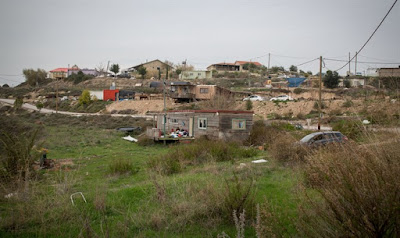by Hillel Fendel
Even though the Knesset has dissolved and new legislation will have to wait until after - way after - the elections in March (a week before Passover), efforts are still underway to get the Government of Israel to approve a very basic civilian need: hasdarah - the official hooking-up of 20 small Jewish communities in Judea and Samaria to the official national water and electricity infrastructures.
The success of these efforts appears to be dependent upon one man: Prime Minister Binyamin Netanyahu.
Netanyahu is said to have a deal with MK Abbas Mansour, leader of the United Arab List party: The Arab MK is to agree to recommend to the President that Netanyahu be appointed to form the next government, or at least not recommend anyone else. Netanyahu, for his part, must arrange for the legalization of three Bedouin villages, including hundreds – some say thousands – of new housing units.
Developments thus far show that the Prime Minister prefers not to recognize the 20 Jewish neighborhoods, for "fear" of upsetting the international community, or other unknown reasons. However, he might do so grudgingly if the Bedouin localities are also recognized.
Last week, Netanyahu was all set to have the Cabinet vote to approve and fund the Bedouin initiative – but was shocked to find that his own Likud Party ministers, and others, refused to do so unless the Jewish communities were also raised for consideration. Netanyahu tried at first to pressure the ministers, but when he saw that this would not work, he simply canceled the vote.
For weeks, Netanyahu has been explaining that he cannot bring up the issue of hasdarah without consent of his unity-government partner, Benny Gantz. However, this excuse has now become moot, as Gantz said clearly at the last Cabinet meeting that he is "very interested" in supporting the "young settlements."
Netanyahu now seems to understand that he has no choice but to put hasdarah to a vote in the Cabinet, but with his great political acumen, he tried to do so by using it to his advantage. He announced that he and Gantz had reached an agreement to consider both the Jewish and Bedouin proposals at the next meeting.
Here the plot took yet another twist. Gantz issued an announcement of his own that he favors granting basic supply of water and electricity to the young Jewish communities, but that he opposes "problematic deals" such as making this contingent upon the Bedouin matter. In fact, he said he would support the former but not the latter.
Another "compromise" then floated by Netanyahu was to approve several dozen new housing units in three Jewish towns – which are already "in the consensus" – in exchange for the Bedouin proposal. This, too, faced strong opposition from within the Likud.
Possibly unsurprisingly, but most disappointingly for Yesha residents, this week's Cabinet Cabinet meeting, scheduled for Sunday, was then canceled – postponed? – because of lack of agreement.
Writes B'sheva columnist Nitzan Kedar: "This story tells us a thing or two that Likud settlement supporters are having difficulty internalizing, or perhaps are simply trying to repress: The Jewish enterprise in Judea and Samaria interests Netanyahu mainly when it intersects with his own personal interests. Most of the Likud government ministers enlisted in the effort to facilitate the hasdarah, but Netanyahu is busy with election calculations. I have said it before, and I will say it again: Netanyahu, from a diplomatic standpoint, is one of the greatest leaders in the history of the State of Israel. Economically, some feel the same while others do not. But from the standpoint of the Yesha enterprise, Netanyahu has advanced it only according to his narrow political interests, or following massive pressure from within his party or coalition."
Just two months ago, a caravan home of a family with four children in Havat Gilad, near Kedumim in the Shomron, was burnt to the ground because of a short in its makeshift electric hookup. By the time the father had helped his family escape safely, turned off the electricity, and dragged away the gas canisters, nothing inside the house was left to save. Regional Council head Yossi Dagan said at the time, "It is truly shocking how close we were to a terrible catastrophe. We cannot continue this way. The government must immediately connect us to the grid, and every delay is unnecessary and dangerous."
As of today (Tuesday), the Forum for the Young Settlements has set up a protest encampment – what they call a "Bedouin protest tent" – outside the Prime Minister's Office. Their demand is very fundamental: "Allow 20 Jewish towns to be connected to the electric grid and water supply."
The protestors say they plan to stay until their demands are met.
The Forum issued this announcement: "From standpoints of principle and national considerations, the State of Israel is obligated to the young Jewish settlement enterprise, ten times more than it is to the Bedouin population. Shamefully, the advancement of the Bedouin is being promoted on a huge scale, while for the Jews, not even the beginning of an arrangement has been made. Given this situation, we too are Bedouins! Perhaps this will cause the Prime Minister to agree to recognize our rights."
